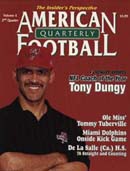Article CategoriesAFM Magazine
|
Q&A With Tony Dungy© More from this issueQ: It seems to me you believe coaches and players have a responsibility to the kids that look up to them. How do you feel about the role of an athlete in the community? A: Whether you want to be or not, you have to face the facts that you are a role model and that's part of the job. I don't necessarily like all the things that go along with it, like dealing with the media and doing interviews. I'd much rather just sit here--all I want to do is coach the team and that's it. But it is part of it and especially in this day and age where so many families are not traditional two-parent families. You just know there are so many boys out there that look at sports figures as role models. Q: What are the differences in being a head coach and having been a coordinator with respect to your interaction with your offensive coordinator....The full article can only be seen by subscribers. |
|
|||||||
| HOME |
MAGAZINE |
SUBSCRIBE | ONLINE COLUMNISTS | COACHING VIDEOS |
Copyright 2025, AmericanFootballMonthly.com
All Rights Reserved





